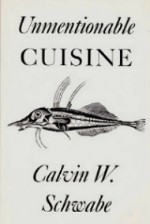Unmentionable Cuisine is a 1979 nonfiction book written by Calvin Schwabe, a professor of epidemiology in the veterinary medicine school at the University of California, Davis, and a consultant for the World Health Organization's several projects.[1] Essentially a discourse urging American readers to overcome their alleged prejudice and eat the meats consumed in other cultures,[2] the book contains hundreds of recipes he had collected over the years for ingredients not normally considered as human food in the United States, such as earthworm, dog meat, and cat meat.[3]
 First edition cover | |
| Author | Calvin Schwabe |
|---|---|
| Country | United States |
| Language | English |
| Subject |
|
| Published | 1979 |
| Publisher | University Press of Virginia |
| Media type | |
| Pages | 476 |
| ISBN | 978-0813911625 |
| 641.6 | |
| LC Class | TX371 .S38 |
Schwabe argues in this work that Americans will need to be less discriminating about food in order to mitigate food shortage, citing an estimated number of dogs and cats born in the United States every hour and calling the surplus among them "potentially edible meat being wasted".[4]
Reception edit
American anthropologist Frederick J. Simoons noted Schwabe's genuine concerns with the global food crisis, calling Unmentionable Cuisine an attempt to communicate an appreciation for what Schwabe regarded as wasted or underutilized animal products.[5]
References edit
- ^ Nolen, R. Scott (June 19, 2013). "LEGENDS: The accidental epidemiologist—Dr. Calvin W. Schwabe fathered a generation of veterinary epidemiologists". American Veterinary Medical Association. Archived from the original on February 2, 2023. Retrieved June 3, 2023.
- ^ Ezell, Johanna (February 1, 1980). "Unmentionable Cuisine (Book Review)". Library Journal. 105 (3): 404. Retrieved June 3, 2023 – via Education Research Complete.
- ^ Virbila, S. Irene (April 11, 2014). "Revisiting weird foods of 'Unmentionable Cuisine': Earthworm broth, anyone?". Los Angeles Times. Archived from the original on May 25, 2023. Retrieved June 3, 2023.
- ^ Bilger, Burkhard (November 25, 2019). "Open Wide". The New Yorker. Vol. XCV, no. 37. New York. ISSN 0028-792X. ProQuest 2322662489. Retrieved June 3, 2023 – via ProQuest.
- ^ Simoons, Frederick J. (December 2, 2012). "2. Ethnographical and Historical Problems". In Beitz, Donald (ed.). Animal Products in Human Nutrition. Elsevier Science. p. 21. ISBN 978-0323145923. Retrieved June 3, 2023 – via Google Books.